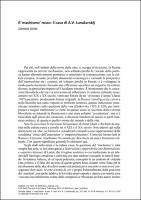Chapter Il ‘machismo’ russo: il caso di A.V. Lunačarskij
| dc.contributor.author | STEILA, Daniela | |
| dc.date.accessioned | 2022-09-15T20:06:19Z | |
| dc.date.available | 2022-09-15T20:06:19Z | |
| dc.date.issued | 2019 | |
| dc.identifier | ONIX_20220915_9788864539102_45 | |
| dc.identifier.issn | 2612-7679 | |
| dc.identifier.uri | https://library.oapen.org/handle/20.500.12657/58249 | |
| dc.language | Italian | |
| dc.relation.ispartofseries | Biblioteca di Studi Slavistici | |
| dc.subject.classification | thema EDItEUR::J Society and Social Sciences::JH Sociology and anthropology::JHB Sociology | en_US |
| dc.subject.other | empirio-criticism | |
| dc.subject.other | Marxism | |
| dc.subject.other | emotions | |
| dc.subject.other | religious thought | |
| dc.subject.other | Anatolij Lunačarskij | |
| dc.title | Chapter Il ‘machismo’ russo: il caso di A.V. Lunačarskij | |
| dc.type | chapter | |
| oapen.abstract.otherlanguage | Empirio-criticism had a huge impact in Russia, where the works of Ernst Mach and Richard Avenarius works were avidly translated and discussed, while the question of whether or not their ideas could be combined with Marxism provoked many disputes within the Russian Social Democratic Labor Party or RSDRP (Rossijskaja social-demokratičeskaja rabočaja partija). Anatolij Lunačarskij, who attended Avenarius’s classes and seminars in Zurich, particularly appreciated the opportunity to blend critical evaluation, emotion, and objective knowledge. In this period prior to the Revolution, Lunačarskij developed a sort of ‘religious’ Marxism, full of hope and enthusiasm for a final human conquest of nature, views that he continued to hold into Soviet times. | |
| oapen.identifier.doi | 10.36253/978-88-6453-910-2.36 | |
| oapen.relation.isPublishedBy | bf65d21a-78e5-4ba2-983a-dbfa90962870 | |
| oapen.relation.isbn | 9788864539102 | |
| oapen.series.number | 43 | |
| oapen.pages | 9 | |
| oapen.place.publication | Florence |

